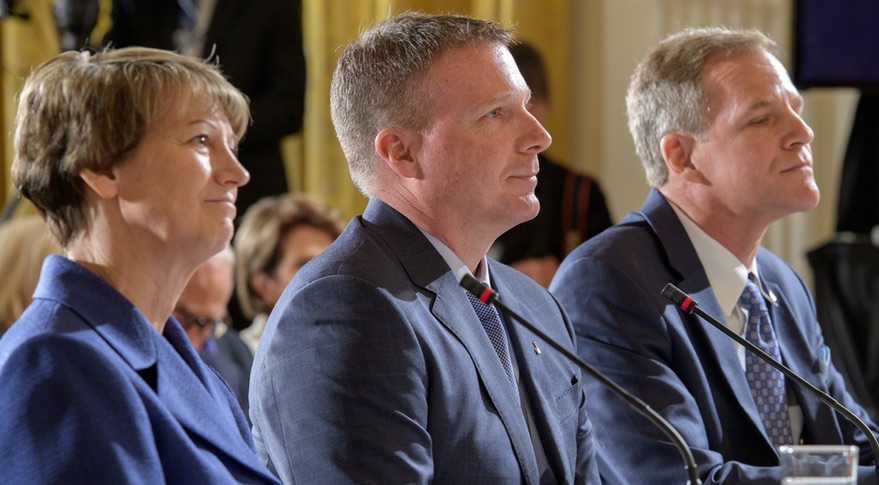Former Astronaut Criticizes NASA's Lunar Gateway Plans

WASHINGTON — A former NASA astronaut used an appearance at a National Space Council meeting June 18 to argue that a key element of NASA's plans to return humans to the moon should be reconsidered.
Appearing on a panel during the meeting at the White House, Terry Virts said that the proposed Lunar Orbital Platform-Gateway, a human-tended facility in orbit around the moon, wasn't an effective next step in human spaceflight beyond Earth orbit after the International Space Station.
"It essentially calls for building another orbital space station, a skill my colleagues and I have already demonstrated on the ISS," he said. "Gateway will only slow us down, taking time and precious dollars away from the goal of returning to the lunar surface and eventually flying to Mars." [6 Private Deep-Space Habitat Concepts for Mars]
Virts wasn't specific on what should replace the Gateway as that next step but called for an Apollo-like model of stepping-stone missions to return to the moon, with ISS, he said, serving well as the Mercury role.
"Now is the time to establish a program that will fill the role of Gemini, developing and testing the technologies that we will need to return to the lunar surface," he said. "Unfortunately, the recently proposed Lunar Orbital Platform-Gateway does not fill that role of Gemini."
Virts' comments came after NASA Administrator Jim Bridenstine said the Gateway played an essential role in developing a long-term, sustainable human presence at the moon.
"This is our opportunity to have more access to more parts of the moon than ever before," he said of the Gateway, a reference to its ability to shift orbits using its electric propulsion system. He also played up the role of the Gateway in bringing in international and commercial partners while taking a leadership role in space exploration.
Breaking space news, the latest updates on rocket launches, skywatching events and more!
"The goal is sustainability," he said. "When we're going to the moon, as the president said in his speech, this time we're going to stay, and the Gateway gives us that great opportunity."
Two other astronauts on the panel did not directly address the suitability of the Gateway, but did argue for an approach to human space exploration that can be sustained without the starts and stops of previous efforts.
"What is important now is that we have a strategy, and we're looking forward," said Eileen Collins. "We stick to our plan, we don't quit and, of course, we remember the lessons learned from the mistakes of the past."
"I'm frustrated with our national failure to commit to a sustained, bold exploration beyond Earth orbit. Sadly, we could probably stack up all the NASA studies that have been done over the years on NASA's next steps into space and attain lunar orbit," said Scott Parazynski.
He advocated specifically for a "true decadal approach" for human spaceflight, modeled on the decadal surveys used to guide investments in NASA science programs. "Sets the goals, then let NASA choose and fund the very best solutions, irrespective in which congressional district is conducted in," he said.
The panel of former astronauts also offered some more general advice, including the importance of international and commercial partnerships, seeking bipartisan support to ensure the long-term viability of NASA's exploration plan, and more outreach to the public. "We have got to get the support of the American people by getting the message out to people," Collins said.
That panel came after another panel of two space scientists and one businessman who has flown payloads on the ISS. They argued for the importance of both human and robotic exploration, rather than one taking precedence over the other.
"I'm a robot guy," said Steve Squyres, a Cornell University planetary scientist who served as principal investigator for the Mars Exploration Rovers mission. "But I firmly believe that the human explorers can achieve far more science than robots ever will."
"I also believe that the humans-versus-robots debate we sometimes hear in space circles is based on a fundamentally false premise," he continued. "Humans and robots are complementary in their strengths and their weaknesses, and a well-designed scientific space exploration will always use both."
The two panels were intended to provide a form of input on NASA's implementation of Space Policy Directive 1, which directs the agency to return humans to the moon, a senior administration official said on background after the meeting.
"These two panels are about making sure we have a public discussion about the best way of going about doing that," the official said. "Now it's about figuring out how we turn that into policy that can continue to push forward Space Policy Directive 1."
This story was provided by SpaceNews, dedicated to covering all aspects of the space industry.

Jeff Foust is a Senior Staff Writer at SpaceNews, a space industry news magazine and website, where he writes about space policy, commercial spaceflight and other aerospace industry topics. Jeff has a Ph.D. in planetary sciences from the Massachusetts Institute of Technology and earned a bachelor's degree in geophysics and planetary science from the California Institute of Technology. You can see Jeff's latest projects by following him on Twitter.

